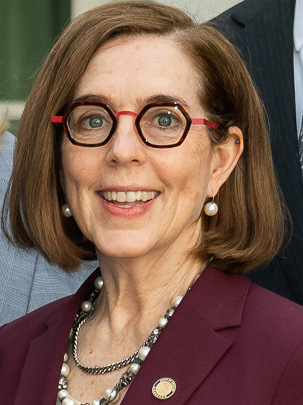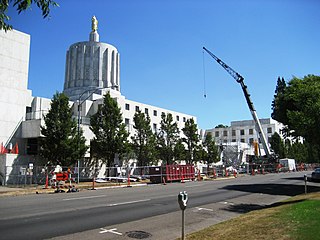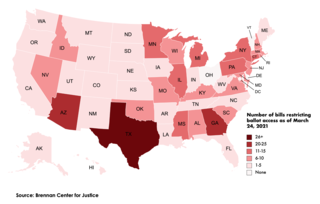Related Research Articles
Electoral fusion in the United States is an arrangement where two or more U.S. political parties on a ballot list the same candidate, allowing that candidate to receive votes on multiple party lines in the same election.
Ballot Measure 47 was an initiative in the U.S. state of Oregon that passed in 1996, affecting the assessment of property taxes and instituting a double majority provision for tax legislation. Measure 50 was a revised version of the law, which also passed, after being referred to the voters by the 1997 state legislature.

In the politics of the United States, elections are held for government officials at the federal, state, and local levels. At the federal level, the nation's head of state, the president, is elected indirectly by the people of each state, through an Electoral College. Today, these electors almost always vote with the popular vote of their state. All members of the federal legislature, the Congress, are directly elected by the people of each state. There are many elected offices at state level, each state having at least an elective governor and legislature. There are also elected offices at the local level, in counties, cities, towns, townships, boroughs, and villages; as well as for special districts and school districts which may transcend county and municipal boundaries.
Oregon has registered domestic partnerships between same-sex couples since 2008 and has expanded the law to begin registering partnerships between opposite-sex couples in 2024.

The Oregon Legislative Assembly is the state legislature for the U.S. state of Oregon. The Legislative Assembly is bicameral, consisting of an upper and lower house: the Senate, whose 30 members are elected to serve four-year terms; and the House of Representatives, with 60 members elected to two-year terms. There are no term limits for either house in the Legislative Assembly.

Oregon's 2006 statewide election included a May 16 primary election and a November 7 general election.

The Oregon House of Representatives is the lower house of the Oregon Legislative Assembly. There are 60 members of the House, representing 60 districts across the state, each with a population of 65,000. The House meets in the west wing of the Oregon State Capitol in Salem.

The Oregon State Senate is the upper house of the statewide legislature for the US state of Oregon. Along with the lower chamber Oregon House of Representatives it makes up the Oregon Legislative Assembly. There are 30 members of the state Senate, representing 30 districts across the state, each with a population of 141,242. The state Senate meets in the east wing of the Oregon State Capitol in Salem.

Elections in California are held to fill various local, state and federal seats. In California, regular elections are held every even year ; however, some seats have terms of office that are longer than two years, so not every seat is on the ballot in every election. Special elections may be held to fill vacancies at other points in time. Recall elections can also be held. Additionally, statewide initiatives, legislative referrals and referendums may be on the ballot.
Term limits legislation – term limits for state and federal office-holders – has been a recurring political issue in the U.S. state of Oregon since 1992. In that year's general election, Oregon voters approved Ballot Measure 3, an initiative that enacted term limits for representatives in both houses of the United States Congress and the Oregon Legislative Assembly, and statewide officeholders. It has been described as the strictest term limits law in the country.

Katherine Brown is an American politician and attorney who served as the 38th governor of Oregon from 2015 to 2023. A member of the Democratic Party, she served three terms as the state representative from the 13th district of the Oregon House of Representatives from 1991 to 1997, three terms as the state senator from the 21st district of the Oregon Senate from 1997 to 2009, three terms as majority leader of the Oregon Senate from 2003 to 2009, and two terms as Oregon Secretary of State from 2009 to 2015. She assumed the governorship upon the resignation of John Kitzhaber in 2015. She was elected to serve out the remainder of his gubernatorial term in the special election in 2016 and was reelected to a full term in 2018.
The Independent Party of Oregon (IPO) is a centrist political party in the U.S. state of Oregon with more than 140,000 registrants since its inception in January 2007. The IPO is Oregon's third-largest political party and the first political party other than the Democratic Party and Republican Party to be recognized by the state of Oregon as a major political party.

Electoral reform in California refers to efforts to change election and voting laws in the U.S. state of California.

Elections in Oregon are all held using a Vote by Mail (VBM) system. This means that all registered voters receive their ballots via postal delivery and can vote from their homes. A state Voters’ Pamphlet is mailed to every household in Oregon about three weeks before each statewide election. It includes information about each measure and candidate in the upcoming election.

The Seventy-fourth Oregon Legislative Assembly was the Oregon Legislative Assembly (OLA)'s period from 2007 to 2008. There was a regular session in 2007, and a shorter special session in 2008.

The 75th Oregon Legislative Assembly convened beginning on January 12, 2009, for its biennial regular session. All of the 60 seats in the House of Representatives and half of the 30 seats in the State Senate were up for election in 2008; the general election for those seats took place on November 4.
Oregon ballot measures 46 and 47 were two ballot measures presented as a single package to voters; 46 would have amended the Constitution to allow limitations on campaign financing ; and 47 detailed specific limitations. While Measure 47 passed, 46 did not, and the Secretary of State and Attorney General now refuse to enforce Measure 47 despite not having made constitutional challenges in court during cases filed against them to compel enforcement.

On November 6, 2012, the U.S. state of Oregon held statewide general elections for four statewide offices, both houses of the Oregon Legislative Assembly, and several state ballot measures.

Following the 2020 United States presidential election and the unsuccessful attempts by Donald Trump and various other Republican officials to overturn it, Republican lawmakers initiated a sweeping effort to make voting laws more restrictive within several states across the country. According to the Brennan Center for Justice, as of October 4, 2021, more than 425 bills that would restrict voting access have been introduced in 49 states—with 33 of these bills enacted across 19 states so far. The bills are largely centered around limiting mail-in voting, strengthening voter ID laws, shortening early voting, eliminating automatic and same-day voter registration, curbing the use of ballot drop boxes, and allowing for increased purging of voter rolls. Republicans in at least eight states have also introduced bills that would give lawmakers greater power over election administration after they were unsuccessful in their attempts to overturn election results in swing states won by Democratic candidate Joe Biden in the 2020 election. The efforts garnered press attention and public outrage from Democrats, and by 2023 Republicans had adopted a more "under the radar" approach to achieve their goals.
References
- ↑ PGP Staff (2006-10-07). "Platform - Pacific Green Party of Oregon" (PDF). Pacific Green Party. Archived from the original (PDF) on 2010-11-26. Retrieved 2010-09-15.
- ↑ Oregon State Archives (2009). "Constitution of Oregon: 2008 Version, Article II - Suffrage and Elections". Oregon Secretary of State . Retrieved 2010-09-15.
- ↑ "75th Oregon Legislative Assembly, 2009 Regular Session - Senate Bill 29" (PDF). Oregon Legislative Assembly. 2009. Archived from the original (PDF) on 2011-06-11. Retrieved 2010-09-15.
- ↑ "IRV Oregon - State News Update". IRV Oregon. July 2009. Archived from the original on 2011-07-26. Retrieved 2010-09-15.
- ↑ "2010 Progressive Party Voter Pamphlet Statement". Oregon Progressive Party. 2010-08-26. Retrieved 2010-09-26.
- ↑ Meek, Dan (2008). "Does Oregon Need a Unicameral Legislature?". Independent Party of Oregon. Archived from the original on 2010-09-24. Retrieved 2010-09-15.
- ↑ Initiative & Referendum Institute (2009). "Oregon". USC Gould School of Law. Archived from the original on 2010-09-24. Retrieved 2010-09-15.
- ↑ Oregon State Archives (2009). "Oregon Blue Book - Initiative, Referendum and Recall: 1912-1914". Oregon Secretary of State . Retrieved 2010-09-15.
- ↑ Oregon Vote-by-Mail Timeline: State Measure 60, page 6
- ↑ "Judge upholds Oregon's vote by mail system". The Register Guard . March 25, 1999. Retrieved November 1, 2010.
- ↑ Mapes, Jeff (2009-07-08). "Kulongoski will sign fusion voting bill". The Oregonian . Retrieved 2010-09-15.
- ↑ Lehman, Chris (2009-03-12). "Lawmakers Say Oregon Should Count More In Presidential Elections". Oregon Public Broadcasting . Retrieved 2010-09-15.
- ↑ Turner, Wallace (1987-04-15). "Oregon Court Broadens Free Speech Rights". The New York Times . Retrieved 2010-09-15.
- ↑ Murasaki, Courtney C. (1999). "Oregon Law Review Spring 1999 - Volume 78, Number 1, Obstacles to Oregon Campaign Finance Reform: Vannatta v. Keisling" (PDF). University of Oregon . Retrieved 2010-09-15.
- ↑ National Conference of State Legislatures (2010-01-20). "Contribution Limits: An Overview". Archived from the original on 2010-09-16. Retrieved 2010-09-15.
- ↑ Common Cause Oregon (2010). "Improving Voter Participation: Oregon Challenges and Opportunities". Common Cause. Archived from the original on 2010-10-12. Retrieved 2010-09-15.
- ↑ "House votes for early voter registration at 16". The Dalles Chronicle. March 28, 2013. Retrieved March 9, 2015.
- ↑ Hogan, Dave (2008-10-13). "Election Day voter registration is proposed". The Oregonian . Retrieved 2010-09-15.
- ↑ Graves, Bill (2010-02-28). "Oregon offers online voter registration". The Oregonian . Retrieved 2010-09-15.
- ↑ "How Oregon hopes to register nearly every last eligible voter". The Washington Post. March 6, 2015. Retrieved March 9, 2015.
- ↑ "Oregon Approves Breakthrough Voter Registration Law". Brennan Center for Justice. March 5, 2015. Retrieved March 9, 2015.